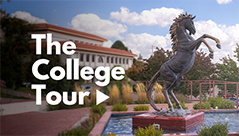Students at WNMU will be continuing a long-lived student organization this year as they revitalize MEChA (Movimiento Estudiantil Chicano de Aztlán). MEChA began in the 1960s as a national activist and educational organization that was fueled by the civil rights movements and especially by the Chicano Movement. Today it has over 400 loosely affiliated chapters, many of them on college campuses, including the chapter at WNMU.
While the organization lost momentum on campus in recent years due to the COVID-19 pandemic, this year, student leaders are determined to bring new energy to the group.
MEChA President Anais Orantez, an English major with minors in Communications and Music, was recently elected to her position after serving in an interim role. She was asked to serve as Interim President by the previous president who no longer had time in his schedule to serve. While Orantez, who is in her second year at WNMU, did not see herself stepping into the role of President so soon, she said that she has been guided not only by the organization’s previous president, but also by the MEChA faculty advisor, Instructor of Music Bryant Chaffino. “He has been helping me a lot,” she said, “and he also trusted me with the position, so I am very grateful for that.”
Orantez said that the first meeting of fall semester was well attended, and the group is developing goals for the coming year. One goal is to reach out to the broader southwestern New Mexico community by participating in this year’s Tamal Fiesta y Más, which will be held in Bayard on November 18.
Another goal is to start a podcast. Inspired by the Navajo podcaster Andi Murphy, who started a podcast about Native American food called “The Toasted Sister,” Orantez said that the MEChA members want to tell stories of Chicano life.
Orantez met Murphy in the summer of 2023, and was inspired by her success. “[Murphy being an] Indigenous writer was great because I also connect to that aspect, being Native American from the Pascua Yaqui tribe,” Orantez said of her own blended cultural heritage. The MEChA members hope to “tell stories—of our home towns, of our experiences,” she said. “We want our MEChistas to be heard.”
In addition to sharing individual’s stories, said Orantez, she hopes that a podcast can bring about awareness of the organization. “Our main focus this year is getting the club back up and running,” she said, “COVID did have a lot to do with [the organization’s numbers] trending down.” However, at the first meeting this semester, observed Orantez, there was a lot of enthusiasm expressed about being involved, so she is confident the group is now gaining momentum. “I think the goal for this year is to get people asking who we are, what we do and what we stand for” as an organization.
Orantez said she is also grateful that WNMU received a Title V grant this year. “We have gotten so many opportunities. Because of that grant, we can start [the] podcast, and we [are having] our building renovated.”
Orantez noted that she was inspired in her work by former WNMU Scholar in Residence Felipe de Ortego y Gasca who was a preeminent scholar of the Chicano Renaissance, a founder of Chicano literary history, and a strong proponent of MEChA. Ortego passed away in 2018; however, through Orantez’s work in the J. Cloyd Miller Library, she had a chance to work with Ortego’s widow, the former University Librarian Gilda Baeza-Ortego. “I never met him, but . . . I feel like I got to learn a lot about him through her.” “I feel like [my service to MEChA] is more for him.” Orantez hopes to honor Ortego as the university renovates the MEChA Building. “I am hoping to see something like a mural of him,” she said, “just to serve as a little homage to him and what he has done.”
Orantez especially appreciates MEChA’s longstanding commitment to Chicano education. Growing up, said Orantez, “It would really hurt my heart when I would see people struggling” in school. “I was always grateful to do well in school,” she said, “but I didn’t realize that there were people that made that happen for me.” Orantez sees her education as something that was earned through the struggles of early Chicano activists. “I owe it all to them, to those people who did the walkouts,” she explained.
That recognition feeds her desire to serve and grow MEChA as an organization. She is especially excited to carry on MEChA’s tradition of civil rights activism. “It’s about getting the stories heard, understanding why [injustice] happens and that it still happens, just in a very discreet way, and we are trying to fight against all of it,” said Orantez. She is committed to raising awareness of the struggles of the Chicano movement, the discrimination that the activists were standing up against, and the walkouts and other steps they took to protest.
Orantez is also looking forward to collaborating with other student organizations, including the Native American Student Alliance, the Black Student Union, Queers and Allies and the newly formed International Student Association. “As an Hispanic Serving Institution,” she said, “we should be creating that awareness hand-in-hand with our international students because we have a lot of people who come here [from other countries] and they need to have a safe space.” She sees organizations like MEChA, NASA, BSU, Q&A and ISA as all working together to provide that space.
“We are one of the oldest organizations on campus,” said Orantez of MEChA, “I want to continue that legacy for [the early leaders of the Chicano Movement] and for future students.”
This story is part of a series in honor of Hispanic Heritage Month.


